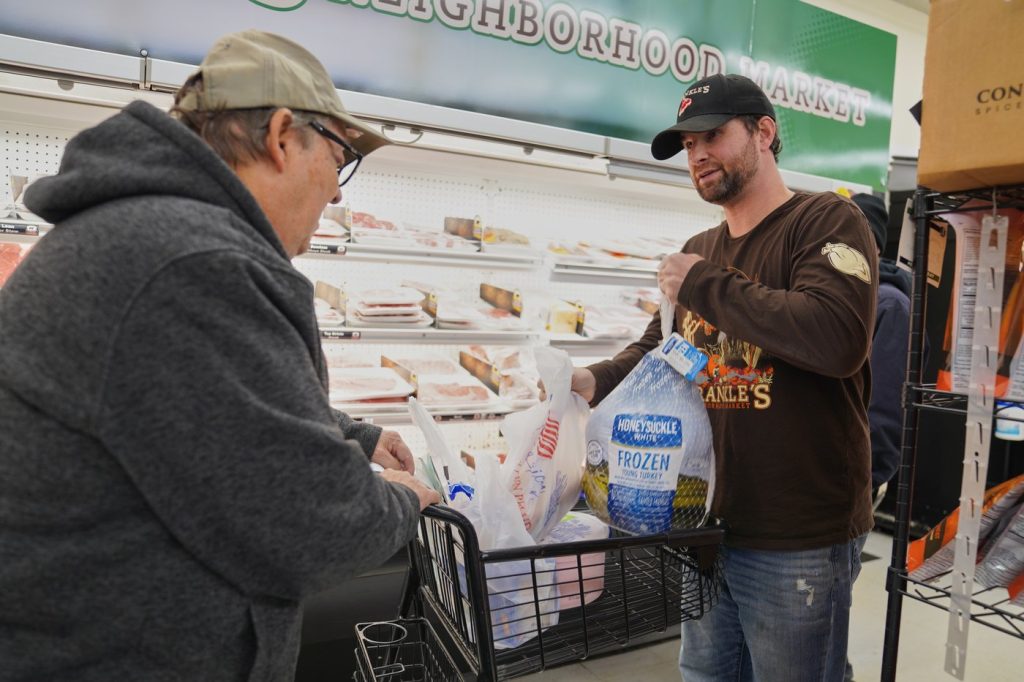Business
Small Grocers Struggle as SNAP Benefits Face Delays

Independent grocery stores and convenience shops across the United States are feeling the strain as delays in Supplemental Nutrition Assistance Program (SNAP) benefits impact food access for millions. The issue stems from a government shutdown that has disrupted funding, leaving many families without vital assistance.
Ryan Sprankle, co-owner of a small grocery chain near Pittsburgh, expressed concern over the situation. He highlighted the challenges faced by his customers, stating, “You can’t take away from the most needy people in the country. It’s inhumane.” The Trump administration froze SNAP funding at the end of October, affecting around 42 million Americans. Although the U.S. Senate recently passed legislation to reopen the government and restore SNAP funds, the U.S. House of Representatives has yet to consider the bill, leaving uncertainty over when benefits will resume.
In 2024, SNAP recipients redeemed over $96 billion in benefits, according to the U.S. Department of Agriculture. Notably, 74% of these benefits were spent at larger superstores and supermarkets, while smaller grocery stores and convenience shops received around 14%. These smaller businesses, often more accessible to low-income customers, are now facing significant financial pressure.
Economic Ripple Effects
Etharin Cousin, a former director of the United Nations World Food Program, emphasized the broader economic impact of the SNAP funding cutoff, stating, “SNAP isn’t just a social safety net for families. It’s also a local economic engine.” Many small grocers, operating on thin profit margins of 1% to 2%, are experiencing immediate declines in sales. At Sprankle’s store in Kittanning, Pennsylvania, 25% of revenue comes from SNAP benefits. He noted that customers not receiving assistance are also cutting back on spending, further straining the store’s finances.
As a result, Sprankle is unable to offer as much overtime to his 140 employees, many of whom are anxious about their job security. He remarked, “They have families to feed, they have kids to buy gifts for.” The potential impact on holiday bonuses adds another layer of concern for both employees and management.
In Chicago, Liz Abunaw, owner of Forty Acres Fresh Market, witnessed firsthand the effects of the SNAP delays. She described a recent incident where a customer had to return a full cart of groceries due to lack of funds without SNAP assistance. Currently, only 12% of her revenue comes from SNAP, but she worries that a reduction in spending could hinder the growth of her business and complicate payments to workers and suppliers. “SNAP is currency. I get money I then use in this economy. It’s not a food box,” Abunaw stated.
Increased Demand at Food Pantries
The suspension of SNAP benefits has also affected non-profit organizations like Kanbe’s Markets. Operating in Kansas City, Missouri, this organization provides fresh produce to 110 convenience stores and supplies food pantries across the region. Founder and CEO Maxfield Kaniger reported a 10% drop in sales at some participating stores shortly after benefits were halted. Simultaneously, food pantries requested double or triple their usual orders, forcing Kanbe’s to purchase more produce, straining resources.
Babir Sultan, who runs four FavTrip convenience stores in food deserts around Kansas City, also noted a decline in foot traffic of 8% to 10% after the SNAP benefits were delayed. In response, he initiated a program offering $10 of free produce to SNAP beneficiaries, while also assisting other customers in need. “If you’re in need, just ask, we’ll take care of you,” Sultan said.
As the debate over SNAP funding continues in Congress, the immediate effects on small grocers and their communities remain pronounced. The struggles faced by these businesses highlight the critical role SNAP plays not just in providing food assistance, but also in supporting local economies and sustaining livelihoods.
-

 Politics5 days ago
Politics5 days agoSecwepemc First Nation Seeks Aboriginal Title Over Kamloops Area
-

 World4 months ago
World4 months agoScientists Unearth Ancient Antarctic Ice to Unlock Climate Secrets
-

 Entertainment4 months ago
Entertainment4 months agoTrump and McCormick to Announce $70 Billion Energy Investments
-

 Lifestyle4 months ago
Lifestyle4 months agoTransLink Launches Food Truck Program to Boost Revenue in Vancouver
-

 Science4 months ago
Science4 months agoFour Astronauts Return to Earth After International Space Station Mission
-

 Technology3 months ago
Technology3 months agoApple Notes Enhances Functionality with Markdown Support in macOS 26
-

 Top Stories1 month ago
Top Stories1 month agoUrgent Update: Fatal Crash on Highway 99 Claims Life of Pitt Meadows Man
-

 Sports4 months ago
Sports4 months agoSearch Underway for Missing Hunter Amid Hokkaido Bear Emergency
-

 Politics3 months ago
Politics3 months agoUkrainian Tennis Star Elina Svitolina Faces Death Threats Online
-

 Politics4 months ago
Politics4 months agoCarney Engages First Nations Leaders at Development Law Summit
-

 Technology4 months ago
Technology4 months agoFrosthaven Launches Early Access on July 31, 2025
-

 Top Stories3 weeks ago
Top Stories3 weeks agoFamily Remembers Beverley Rowbotham 25 Years After Murder




















